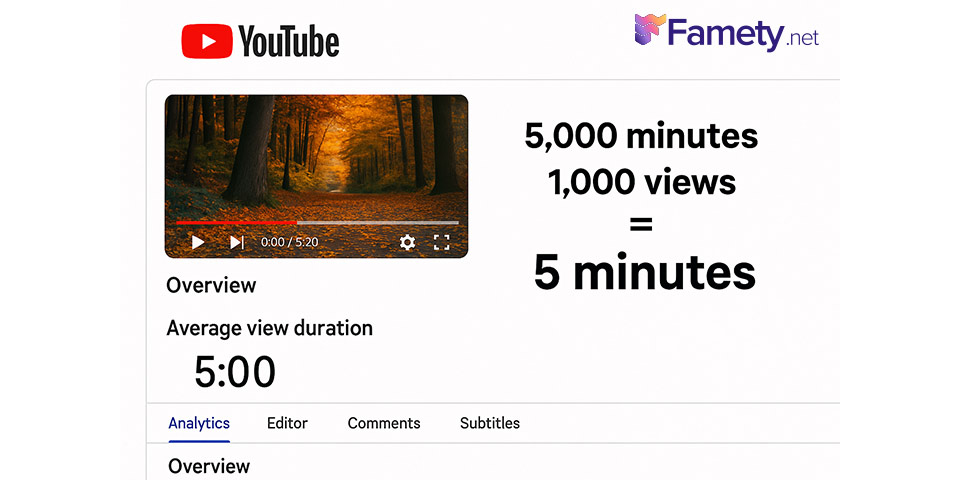- AVD stands for “Average View Duration,” a core YouTube metric that measures how long viewers watch your videos on average.
- It directly affects video performance, including ranking in search and suggested videos through YouTube’s algorithm.
- Improving AVD involves strategies like stronger hooks, reduced drop-off points, and more engaging video structures.
- Creators aiming to grow their channel and boost monetization must prioritize increasing their AVD consistently.
As you dive deeper into creating content for YouTube, you’ll start seeing a lot of metrics that seem confusing at first. One of the most important and often misunderstood is AVD, or Average View Duration. In simple terms, AVD tells you how long, on average, viewers are watching your videos. But it goes far beyond a simple number. Understanding what AVD is, how it’s calculated, why it matters, and how you can improve it, is essential if you’re serious about growing your YouTube channel. Let’s break it down.
What Does AVD Stand For on YouTube?
AVD stands for Average View Duration. It is a key performance metric within YouTube Analytics. In essence:
Average View Duration (AVD) = Total watch time ÷ Total number of views.
For example, if your video has 1,000 views and has generated 5,000 minutes of watch time, then:
AVD = 5,000 minutes ÷ 1,000 views = 5 minutes average per view.
This means that on average, people watched 5 minutes of your video regardless of whether some watched it fully or left early. Understanding this helps you interpret what viewers are doing, not just raw view counts.

Why Does AVD Matter?
Engagement, Retention & the Algorithm
The reason AVD matters is that it signals to YouTube’s algorithm how engaging your content is. Higher AVD indicates viewers are staying for longer, which means your video is good at keeping attention. As noted in multiple analyses:
“YouTube’s algorithm loves videos with high AVD … the more time viewers spend watching your content, the more likely YouTube is to recommend it.”
How It Differs From Other Metrics
It’s important to recognize that AVD is not the same as Average Percentage Viewed (APV). AVD is a time‑based number (e.g., 5 minutes), whereas APV is a percentage of the total video watched (e.g., 50 %).
Good APV might show viewers watched 70% of a short video, but if the video itself is 2 minutes long, the AVD will only be ~1.4 minutes. Conversely, a longer video might have a lower percentage but a higher AVD, which can still be valuable.
Watch Time vs Views
View count is important, but if viewers click away quickly your view count doesn’t tell the full story about your YouTube watch time. A video with 100,000 views but an AVD of only 30 seconds might be underperforming in terms of keeping viewer interest. Some creators on Reddit point out:
“AVD and APV are certainly two of the most important factors YouTube uses to ‘judge’ a video.”
What Is a Good AVD?
There’s no one‑size‑fits‑all number for “good” AVD it depends on your niche, video length, and audience. However, general guidelines suggest:
- If your video is short (under 5 minutes): Aim for 50–70% view percentage (so for a 4‑minute video, that’s ~2–2.8 minutes).
- For longer videos: Even 40–60% can signal strong engagement if the video is well‑made.
- Focus on improving your own AVD over time rather than comparing directly with other channels.
How to Find Your AVD in YouTube Analytics
Here’s how to locate AVD for your channel or a specific video:
- Go to YouTube Studio → Analytics → Content tab.
- Select a specific video, then go to the Audience tab → Advanced Mode.
- In the drop‑down list, choose “Average View Duration”.
You’ll also see Retention Graphs which show where viewers drop off these help you understand what may be causing low AVD.
7 Ways to Improve Your AVD
Improving AVD is about keeping viewers interested and hooked throughout your video. Here are practical ways to raise that number:
Hook Them Immediately
Your first 5–15 seconds are critical. Start with a compelling question or teaser: “You’ll learn how to earn 3x revenue in 10 minutes…” Most drop‑off happens early, so make that start count.
Keep a Strong Structure
Organize your content like a story: intro, build-up, climax, resolution. A clear structure helps maintain momentum and keeps viewers watching longer.
Cut the Dead Weight
Eliminate long intros, redundancies, and silences. Every part of the video should give value or move things forward.
Use Visual Variety & Engagement
Keep visuals moving, add B‑roll, overlays, and chapters. Use chapters especially in longer videos so viewers can navigate easily.
Leverage Playlists
Group videos into themed playlists so viewers keep watching more videos after the first one ends. This boosts overall watch time and channel growth.
Align Video Length with Audience Expectations
Longer videos can work but only if the content remains strong. Test different lengths and check what performs with your subscribers.
Monitor Data & Iterate
Use retention graphs to find where viewers drop off or rewind. Adjust your future videos to fix those weak spots.
Common Mistakes Around AVD
- Chasing high AVD at any cost: Quality still matters. A longer video with low viewer satisfaction may backfire.
- Ignoring video length context: AVD alone doesn’t tell the full story consider APV and view count together.
- Underestimating the hook: Many creators lose viewers early and never recover.
- Comparing across niches: A comedy channel’s “good” AVD will differ from a deep‑dive educational channel.
Does Increasing AVD on YouTube Affect Your Revenue?
Increasing AVD on YouTube can positively affect your revenue, but not in a direct, one-to-one way. On YouTube, earnings are driven by ad impressions, monetized playbacks, and advertiser demand. However, AVD plays a critical supporting role by influencing how long viewers stay and how many ads they are exposed to.
Summary by Editor: CPV stands for Cost Per View: a payment model on YouTube where advertisers pay when their video ad is watched or interacted ...
Summary by Editor: MCN stands for Multi‑Channel Network: a company that partners with multiple YouTube creators to provide services and revenue‑shari...
When AVD increases, several revenue-related mechanisms are triggered:
- More ad opportunities: Longer viewing sessions allow mid-roll ads to be shown, increasing total ad impressions.
- Stronger monetization signals: Videos with higher retention are often considered higher quality, which can attract better ad placements.
- Improved session duration: AVD contributes to overall YouTube watch time, which helps videos perform better in recommendations and suggested feeds.
These factors do not guarantee higher income on their own, but they significantly raise the ceiling of what a video can earn.
Final Thoughts
Understanding AVD on YouTube isn’t just about looking at a number it’s about interpreting viewer behavior, learning what holds attention, and creating content that genuinely engages your audience. While views and likes matter, AVD gives you insight into how well your video sustains viewer interest.
So, when you upload your next video, don’t just check view count. Dive into Analytics, find your AVD, and ask: “Can I make this better?” Remember: higher AVD means longer watch time, better algorithm signals, and real channel growth.







